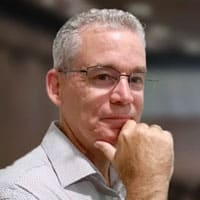Editor’s note: Dave Buck is a longtime columnist with Rethinking65. Read more of his articles here.
 Toward the end of 2024, I went back to “corporate world.” As my wife and I planned out 2025, we saw an opportunity for Susan to focus all her efforts on her non-profit. However, it would require us to have a more predictable income. Therefore, I partially hibernated my consulting business and took a leadership role with a former employer.
Toward the end of 2024, I went back to “corporate world.” As my wife and I planned out 2025, we saw an opportunity for Susan to focus all her efforts on her non-profit. However, it would require us to have a more predictable income. Therefore, I partially hibernated my consulting business and took a leadership role with a former employer.
When I started my own business as a solopreneur, I was not prepared for the social isolation I experienced (even though I am an introvert). I quickly realized that many of my relationships were tied exclusively to work and did not carry over into my personal life. I got a taste of what retirement life is like. When a person fully exits the workforce and shifts all their time to private activities, it is quite an adjustment.
Now back in a structured professional setting (even though it is remote), I have a flood of new relationships and contacts demanding my time and effort. Yet I am more aware than ever that before I exit into post-career life, I need to invest time in meaningful personal relationships that will stay endure regardless of my employment status.
Loneliness and Social Isolation is Common
According to a report from the National Academies of Sciences, more than one-third of adults aged 45 and older feel lonely. The study also reports that nearly 25% who are 65 and older are considered to be socially isolated. That means today there are some 14 million people in the United States alone who lack basic interaction with other people. As the population grows older, this number is bound to increase. You probably do not have to go far from your house to find a neighbor who spends most of their days alone. I bet wealth managers see this often.
As financial advisors guide clients into the next phase of life, one crucial yet overlooked area deserves their attention: their clients’ social network. Just as advisors audit assets or liabilities, they can also encourage clients to conduct a social audit — a tool that can protect both the clients’ emotional health and financial well-being.
The Hidden Risks of Isolation in Retirement
Social isolation in retirement isn’t just an emotional challenge — it can significantly affect a client’s overall well-being. Beyond dampening day-to-day satisfaction, it increases the risk of depression, anxiety, cognitive decline and even chronic illness. In fact, research links social disconnection with higher mortality rates. Isolation can also influence a client’s financial behavior, leading to reduced engagement with their plan and poorer decision-making over time.
The causes are complex and often interwoven. Retirement removes the built-in social structure of work, and health or mobility issues can make getting out and staying connected more difficult. The loss of a spouse or close friends may lead to emotional withdrawal, while financial constraints limit access to social outlets. Even choosing to “age in place” — while often desirable — can unintentionally create barriers to community involvement. These risks don’t discriminate by income; even clients with ample resources are vulnerable if this aspect of planning is overlooked.
How Advisors Can Guide a Social Network Audit
Financial advisors are uniquely positioned to help clients safeguard not only their financial independence but also their social well-being in retirement. By incorporating a social health conversation into the planning process, advisors can help clients take stock of their relationships and create a plan that fosters lasting connection.
It starts with a simple but powerful question: “Who are the people you want in your life 10 years from now — and what will it take to keep those relationships strong?” This opens the door to broader discussions around values, purpose and lifestyle aspirations.
From there, advisors can guide clients through a “social network audit.” This involves mapping out key relationships — including friends, family, community groups, spiritual or volunteer affiliations — and evaluating the strength and frequency of those connections.
Like any risk assessment, it’s important to identify potential vulnerabilities, such as over-reliance on one person, geographic distance from support systems or the loss of key social anchors.
Advisors can then help clients build a social engagement plan alongside their financial plan, incorporating strategies like relocation, community involvement, travel budgets for connection, and relationship goals to promote ongoing social engagement. It’s a meaningful way to ensure that retirement isn’t just financially secure — it’s emotionally and socially fulfilling, too.
What’s in it for the Advisor
Focusing on a client’s social well-being isn’t just beneficial for them — it’s a smart business strategy for advisors. Those who address the full picture — including money, meaning, and mental health — position themselves as forward-thinking and deeply client-centered.
Clients who feel seen, connected, and emotionally supported are more loyal, more likely to refer others and more confident in both their advisor and their overall financial plan. This deeper engagement leads to stronger relationships and better long-term outcomes for everyone involved.
As Susan keeps busy running her non-profit, Diakonos Solutions, I am busier than ever, too. I’m talking to more people every day than I have in a long while. However, the only commonality with the these people I speak with is tied to my occupation not my personal life. I know that when I choose to fully rouse my business or exit the workforce entirely, to fully maximize the financial benefits I have accumulated, I’ll need to ensure I am maintaining and cultivating human relationships.
David Buck is the author of the book “The Time-Optimized Life,” co-author of the book, “The Retirement Collective,” owner of Kairos Management Solutions LLC, and founder of the Infinity Lifestyle Design program. As a certified professional retirement coach (CPRC), David works with financial services providers helping their clients create a post-career lifestyle strategy. To learn more, contact him at dave@kmstime.com or visit Infinity Lifestyle Design







